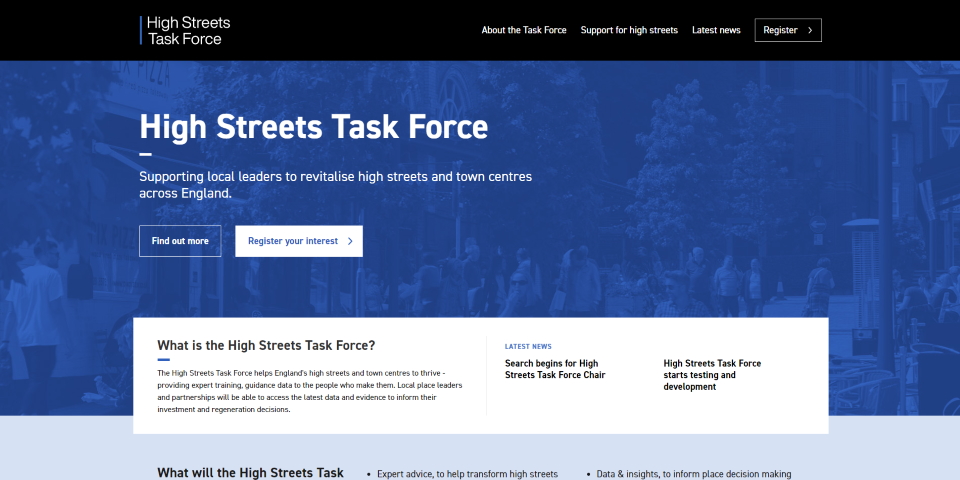If I can begin by thanking Alex for his kind introduction, and, indeed, for the invitation to be your guest speaker tonight. It is, of course, a great honour to be here with you all this evening, enjoying such wonderful company and hospitality, especially as we all get used to the idea of being in a room with other people again.
Indeed, the topic that Alex has asked me to talk about tonight is something that has been greatly impacted by Covid – the high street.
I believe I’ve got about seven minutes to share my thoughts on how we can futureproof and celebrate our town and city centres. And these are not just places where we shop, but places where we meet people, build friendships, put down our roots, and become part of a community.
If, like me, you’re regularly immersed in social media and websites, it’s quite likely that you’ve come across a little abbreviation: TLDR. It means “too long, didn’t read”, and is like a spoiler at the start of an article where you quickly summarise the conclusion that you reach at the end. So, here’s my TLDR: the high street isn’t dead.
After the year we’ve just had, that might seem a bold statement. Certainly, if you look at almost any town or city centre in the country, you can see the process of change. Of course, change isn’t a new thing – the Clothworkers’ Company has seen immense place-based change over its 500 years, and the look and feel of our town and city centres now is very different to how they were 10, 20, 50 or 100 years ago.
However, what is different now, perhaps, is the pace and scale of change. Change that has certainly been turbo-charged by Covid, but that has its origins in the rapid growth of out-of-town retail over the past few decades, and, of course, the more recent growth of shopping online.
Indeed, over the last year we have seen some big names vanish, or migrate online under new ownership. Debenhams, Laura Ashley, Topshop.
Burton too – a business that was once proud to be “The Tailor of Taste”, and, like The Clothworkers’ Company, an organisation that can trace strong Yorkshire roots as a benefactor of the University of Leeds.
Covid didn’t kill any of these businesses. It took retailers that were already weak – that had lost sight of what they were for, that had stopped giving customers what they wanted, or that were simply laden with unsustainable debt – and gave them a metaphorical push.
Flip that around, though, and there are plenty of positive headlines too – even if you often have to dig a bit deeper to find them.
If you’ve read your dinner programme, I believe it notes that ITV once referred to me as a “North East Mary Portas”. I don’t yet have quite the same media profile, but it’s a nice analogy for how I spend much of my time – on the ground, working with places and businesses, and helping them not just offer fantastic experiences to the communities they serve, but making sure that everyone knows how much good stuff there is on their doorstep.
And believe me, from my work in places as diverse as Gloucester, Reading, Putney and Somerset, I can tell you that there are some brilliant businesses out there, many of them independent. And the way that they have pivoted, innovated and communicated over the past year is something to inspire us all. The resilience and creativity they have shown has been immense – and in places where I work, like Durham, that has been reflected not only in long-established businesses making it through the pandemic, but in new shops, cafés, bars and restaurants opening up, even in the middle of lockdowns.
I regularly make the point that independents are at the heart of the future high street. And that is really something to celebrate, as we move away from clone towns towards places that are more distinctive, more local, more interesting. Places that give us a reason to get off Amazon, and to go and visit somewhere that we can mingle, be inspired, and tap into our emotions and senses.
Of course, independents alone can’t fill all the retail spaces that are being vacated, but you can start to create interesting mixed-use hubs where different functions come together to create their own dynamism.
Former department stores in places like Hull and Bournemouth are being repurposed for schemes that bring together local food, drink and retail with functions such as entertainment, culture and workspaces. None of these things can, or should, recreate what is lost, but they generate a different kind of energy, footfall and destination. Indeed, I was delighted to read that the Clothworkers’ Foundation has supported the development of The Haven in Westcliff-on-Sea, turning the old Havens department store into a community hub, led by Age Concern Southend, that retains that building as the social heart of the town.
Alongside these kinds of uses, we need more people living in the centres of towns and cities too. Too many places I visit become ghost towns when the retail shutters are pulled down at 5pm. But if we can grow the number of residents living above and around the shops, we can start to curate places that are more sustainable, more secure, and, dare I say it, more like many of our UK towns and cities were before retail started to push out everything else.
The good news is that much of this is starting to happen already. Many local authorities are making creative use of the buildings that they own. Landlords are being increasingly realistic about how their buildings might be used, and the rents they can charge. And Business Improvement Districts are offering practical support to their traders, and pushing positive messages about what their places offer.
As a High Streets Task Force Expert, it’s a pleasure to be helping places envision what they want their towns to be, and to make sure that the energy and input of all the key local stakeholders is harnessed as part of any transformation. Again, it’s that principle of tapping into, and investing in, the capacity of local communities that I know is so important to The Clothworkers too.
There is, as always, more to do. Some businesses face challenging times ahead as they start repaying debts, or having business rates bills arrive again. From my work with retailers, I know that business rates remain one of the biggest barriers to businesses opening or expanding, and we desperately need a new, modern system of non-domestic taxation that is fair to businesses that trade offline, online or both. I hope the government’s “fundamental review” of business rates, due in the autumn, will deliver on that front.
But I started on a positive note and I want to end on one too. I am lucky enough to love the job that I do, and to work with some incredible businesses and places. The media sometimes seems to thrive on the “death of the high street” narrative, and while, of course, there are many big challenges, there are some really positive and innovative things happening too.
So, I encourage all of you to discover or rediscover your local high street – something that many of us have already been doing this last year. The high street isn’t dying but it is certainly evolving – and I, for one, am really excited about what the future might hold.
Speech delivered at Clothworkers’ Hall, London, on 20 July 2021. For more information about the excellent community-based work of The Clothworkers’ Foundation, visit the website.



